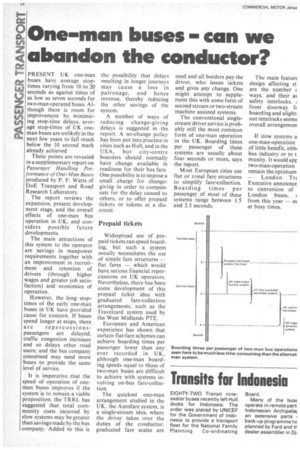One-man buses can we abandon the conductor?
Page 26

If you've noticed an error in this article please click here to report it so we can fix it.
PRESENT UK one-man buses have average stoptimes varying from 10 to 20 seconds as against times of as low as seven seconds for two-man operated buses. Although there is room for improvement by minimizing stop-time delays, average stop-times of UK oneman buses are unlikely in the next few years to fall much below the 10 second mark already achieved.
These points are revealed in a supplementary report on Passenger Handling Performance of One-Man Buses produced by P. F. Watts of DoE Transport and Road Research Laboratory.
The report reviews the expansion, present development stage, and the overall effects of one-man bus operation in UK, and considers possible future developments.
The main attractions of this system to the operator are savings in manpower requirements together with an improvement in recruitment and retention of drivers (through higher wages and greater job satisfaction) and economies of operation.
However, the long stoptimes of the early one-man buses in UK have provided cause for concern. If buses spend longer at stops, there are repercussions: passengers are delayed; traffic congestion increases and so delays other road users; and the bus company concerned may need more buses to provide the same level of service.
It is imperative that the speed of operation of oneman buses improves if the system is to remain a viable proposition; the TR R L has suggested that total community costs incurred by slow systems may be greater than savings made by the bus company. Added to this is the possibility that delays resulting in longer journeys may cause a loss in patronage, and hence revenue, thereby reducing the other savings of the system.
A number of ways of reducing change-giving delays is suggested in the report. A no-change policy has been put into practice in cities such as Hull, and in the USA, but city-centre boarders should normally have change available in readiness for their bus fare. One possibility is to impose a small charge for changegiving in order to compensate for the delay caused to others, or to offer prepaid tickets or tokens at a discount.
Prepaid tickets
Widespread use of prepaid tickets can speed boarding, but such a system usually necessitates the use of simple fare structures — flat fares — which would have serious financial repercussions on UK operators. Nevertheless, there has been some development of this prepaid ticket idea with graduated fare-collection arrangements, such as the Travelcard system used by the West Midlands PTE.
European and American experience has shown that certain flat-fare schemes can achieve boarding times per passenger lower than any ever recorded in UK, although one-man boarding speeds equal to those of two-man buses are difficult to achieve with systems involving on-bus fare-collection.
The quickest one-man arrangement studied in the UK, the Autofare system, is a single-stream idea, where the driver takes over the duties of the conductor: graduated fare scales are used and all borders pay the driver, who issues tickets and gives any change. One might attempt to supplement this with some form of second stream or two-stream machine assisted systems.
The conventional singlestream driver service is probably still the most common form of one-man operation in the UK. Boarding times per passenger of these systems are usually about four seconds or more, says the report.
Most European cities use flat or zonal fare structures to simplify fare-collection. Boarding times per passenger of most of these systems range between 1.5 and 2.5 seconds. The main featurt design affecting st are the number ways, and their as safety interlocks. 1 front doorway ft boarding and alight out interlocks seems overall arrangemeni If slow systems a one-man-operation of little benefit, eitht bus industry or to t munity. It would apr two-man-operation remain the optimum — London TN Executive announce to conversion of London buses, t from this year — es at busy times.
























































































































